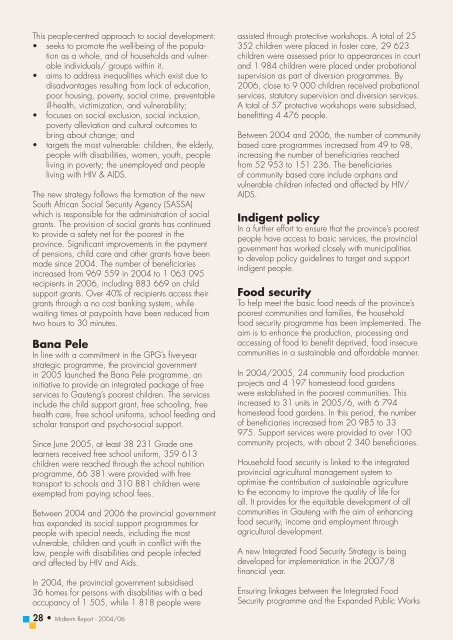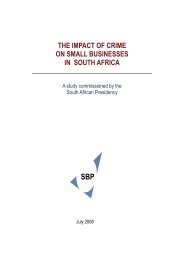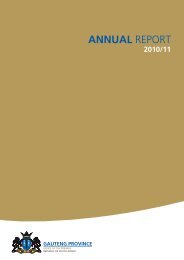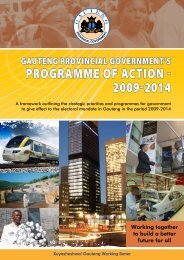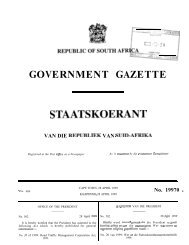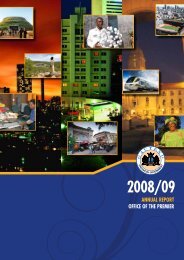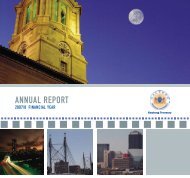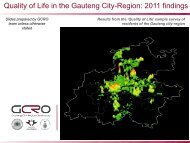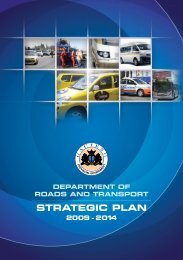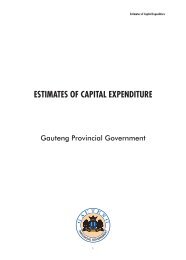Mid Term Report - Gauteng Online
Mid Term Report - Gauteng Online
Mid Term Report - Gauteng Online
You also want an ePaper? Increase the reach of your titles
YUMPU automatically turns print PDFs into web optimized ePapers that Google loves.
This people-centred approach to social development:• seeks to promote the well-being of the populationas a whole, and of households and vulnerableindividuals/ groups within it.• aims to address inequalities which exist due todisadvantages resulting from lack of education,poor housing, poverty, social crime, preventableill-health, victimization, and vulnerability;• focuses on social exclusion, social inclusion,poverty alleviation and cultural outcomes tobring about change; and• targets the most vulnerable: children, the elderly,people with disabilities, women, youth, peopleliving in poverty; the unemployed and peopleliving with HIV & AIDS.The new strategy follows the formation of the newSouth African Social Security Agency (SASSA)which is responsible for the administration of socialgrants. The provision of social grants has continuedto provide a safety net for the poorest in theprovince. Significant improvements in the paymentof pensions, child care and other grants have beenmade since 2004. The number of beneficiariesincreased from 969 559 in 2004 to 1 063 095recipients in 2006, including 883 669 on childsupport grants. Over 40% of recipients access theirgrants through a no cost banking system, whilewaiting times at paypoints have been reduced fromtwo hours to 30 minutes.Bana PeleIn line with a commitment in the GPG’s five-yearstrategic programme, the provincial governmentin 2005 launched the Bana Pele programme, aninitiative to provide an integrated package of freeservices to <strong>Gauteng</strong>’s poorest children. The servicesinclude the child support grant, free schooling, freehealth care, free school uniforms, school feeding andscholar transport and psycho-social support.Since June 2005, at least 38 231 Grade onelearners received free school uniform, 359 613children were reached through the school nutritionprogramme, 66 381 were provided with freetransport to schools and 310 881 children wereexempted from paying school fees.Between 2004 and 2006 the provincial governmenthas expanded its social support programmes forpeople with special needs, including the mostvulnerable, children and youth in conflict with thelaw, people with disabilities and people infectedand affected by HIV and Aids.In 2004, the provincial government subsidised36 homes for persons with disabilities with a bedoccupancy of 1 505, while 1 818 people wereassisted through protective workshops. A total of 25352 children were placed in foster care, 29 623children were assessed prior to appearances in courtand 1 984 children were placed under probationalsupervision as part of diversion programmes. By2006, close to 9 000 children received probationalservices, statutory supervision and diversion services.A total of 57 protective workshops were subsidised,benefitting 4 476 people.Between 2004 and 2006, the number of communitybased care programmes increased from 49 to 98,increasing the number of beneficiaries reachedfrom 52 953 to 151 236. The beneficiariesof community based care include orphans andvulnerable children infected and affected by HIV/AIDS.Indigent policyIn a further effort to ensure that the province’s poorestpeople have access to basic services, the provincialgovernment has worked closely with municipalitiesto develop policy guidelines to target and supportindigent people.Food securityTo help meet the basic food needs of the province’spoorest communities and families, the householdfood security programme has been implemented. Theaim is to enhance the production, processing andaccessing of food to benefit deprived, food insecurecommunities in a sustainable and affordable manner.In 2004/2005, 24 community food productionprojects and 4 197 homestead food gardenswere established in the poorest communities. Thisincreased to 31 units in 2005/6, with 6 794homestead food gardens. In this period, the numberof beneficiaries increased from 20 985 to 33975. Support services were provided to over 100community projects, with about 2 340 beneficiaries.Household food security is linked to the integratedprovincial agricultural management system tooptimise the contribution of sustainable agricultureto the economy to improve the quality of life forall. It provides for the equitable development of allcommunities in <strong>Gauteng</strong> with the aim of enhancingfood security, income and employment throughagricultural development.A new Integrated Food Security Strategy is beingdeveloped for implementation in the 2007/8financial year.Ensuring linkages between the Integrated FoodSecurity programme and the Expanded Public Works28 • <strong>Mid</strong>term <strong>Report</strong> - 2004/06


